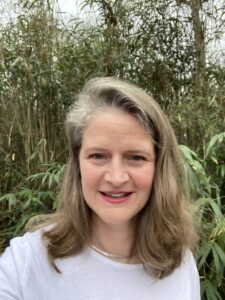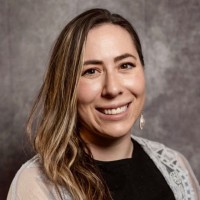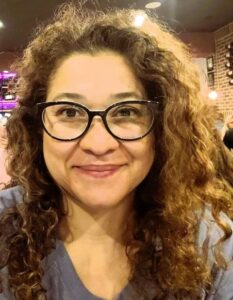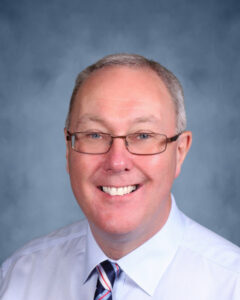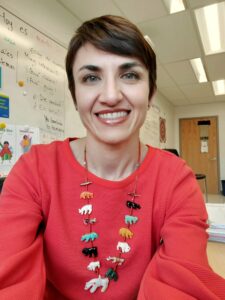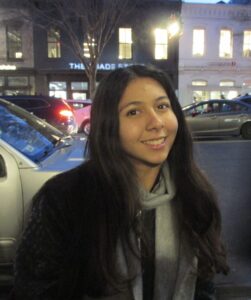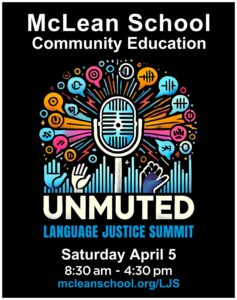 “Unmuted” is a transformative space where educators, administrators, and advocates come together to confront and dismantle the language-based barriers in educational institutions. Geared toward teachers, school leaders, and educational staff, this Summit offers practical tools, strategies, and resources to promote linguistic equity in schools. “Unmuted” is a transformative space where educators, administrators, and advocates come together to confront and dismantle the language-based barriers in educational institutions. Geared toward teachers, school leaders, and educational staff, this Summit offers practical tools, strategies, and resources to promote linguistic equity in schools.
The Unmuted: Language Justice Summit is made possible by the Chai Lys Endowment for World Languages and Global Belonging. $30 – Educators |
 Keynote Speaker, Allison Perryman Keynote Speaker, Allison PerrymanCentering Justice: Rethinking Language & Culture in the Classroom Language has the power to shape our worldview, foster empathy, and challenge inequities—but whose stories are we telling in the classroom? This keynote invites educators to critically examine and decenter Eurocentric norms in curricula, embrace diverse voices and perspectives, and build classrooms that inspire advocacy for justice. Through practical strategies, authentic examples, and actionable steps, participants will learn how to elevate underrepresented communities, reframe teaching materials, and create equitable learning environments. Together, we’ll explore how our world language classrooms can become a transformative space and a crossroads for cultural understanding, inclusion, and global citizenship. Bio |
Workshops
Unmuting Curriculum: The Importance of Direct, Explicit, and Systematic Instruction for All Learners – the Focus Language is English
Amy Aden Dunn
Middle School Teacher
McLean School
The English language is especially problematic for learners because it has so many influences and few absolute rules. It requires considerable background information and flexibility. So many underlying structures and strategies are not directly taught to students. Students who often miss this instruction are minorities. I will demonstrate and show some of the direct instruction that I have found that helps students that is not typically taught even in classrooms that follow the science of reading in terms of phonics instruction.
About Amy Aden Dunn
After graduating with a BA in English from Georgetown University, Amy explored teaching through a volunteer program in South Africa. This experience inspired her to pursue a career in education, leading her to earn a Master’s in Special Education from American University. Her teaching career spans from grade 3 to the collegiate level and has focused on exploring best practices and collaborating with colleagues and students to develop creative approaches to learning abstract concepts. Intensive training in programs such as Orton-Gillingham, Lindamood-Bell, Step Up To Writing, Singapore Math, and Framing Your Thoughts, along with interning with master practitioners of Wilson Reading and Project Read, has enabled her to assess the strengths of various educational methods and continuously seek new strategies to help students navigate the complexities of language and logical thinking. Recognizing that each student is unique, Amy tailors her approach to individual needs, using assessments and songs, puppets, hands-on projects, or structured processes to make learning effective and engaging.
Unmuting Allyship: Using Proficiency Portfolios to Empower Student Advocacy in Language Learning
Traci Dougherty
Latin Teacher
Upper Dublin High School
By tracking progress and encouraging student voice in self-assessments, proficiency portfolios empower students to advocate for their linguistic needs and those of their peers. This session explores how portfolios promote teacher-student dialogue on fair assessment, support students in developing self-advocacy skills, and foster a classroom culture of linguistic allyship. Participants will engage in hands-on activities to design portfolio components that encourage student agency, reflection, and peer support, ensuring all learners feel valued in the language classroom.
About Traci Dougherty
Traci Dougherty is a passionate Latin teacher at the Upper Dublin High School, bringing her students a deep appreciation for classical languages and cultures. With a focus on fostering critical thinking and linguistic proficiency, she strives to make Latin accessible and engaging, helping students develop a strong foundation in both the language and the rich history behind it. Traci is dedicated to creating a classroom environment that encourages curiosity and personal growth in her students.
The Future is Now: Global Competence
Mónica Mena-Cuellar
Spanish Teacher
Fairfax County Public Schools
The presentation focuses on how World Language Classrooms can develop global competence, as our students are eager to solve real-world problems and are able to communicate ideas in different languages. Students can share their interests, and they will acknowledge that there are other cultures and perspectives in the world.
The information presented shows how to use the “United Nations Sustainable Development Goals (SDGs)” to make connections between students’ priority knowledge and enhance and expand their learning of a second language (Spanish/English) using PBL with students from other countries. It allows our students to develop skills and competencies to participate as citizens in a globalized world, now and in the future.
The resources will benefit you, as the teacher, as you guide your students through this global learning experience. This conference prioritized Principles based on Student-centered -Design, Authentic, Engaging Materials, and Formative feedback and assessment using Can-Do Statements of ACTFL.
About Mónica Mena-Cuellar
Mónica Mena-Cuellar is a Colombian Spanish teacher at Fairfax County Public Schools. She has taught for over 25 years in Colombia at the elementary, middle, and high school levels and in the United States for preschool and elementary schools. She is a specialist in Social Studies and Science and Technological Innovation (STS). She has a master’s degree in Enseñanza del Español y su Cultura from Universidad de Granada of Spain. Ms. Mena has participated and is a co-developer of the curriculum: FLES-LTC Literacy Guide Updates for FCPS 2021 and 2022. She co-developed and researched the developing policy for the Technology Education Curriculum for Public Schools in Bogotá DC in Colombia 2012.
Also, Ms. Mena has published an article titled: “La Educación de Tecnología en Colombia” in the Educative Magazine Aula editorial GRAO of Spain. She researched, co-developed, and published instructional materials for teachers and students for grades 1-6, which are needed for an appropriate learning context in technology education with the Corporation Didactica Recursos Educativos–ALECOP of Pais Vasco.
She has initiated research and is very interested in the latest Neurosciences studies and Global Competence and its connection with the teaching/learning to use in the World Languages classrooms. She had the honor to be a presenter in the annual conference VADLEN Dual Language/Immersion (DL/I) 2024 and other prestigious conferences such as FLAVA 2023 and 2024; GWATFL 2023, and In-Service Fairfax County Public Schools 2023 and 2024 for FLES Spanish Teachers.
How Might Some AP Human Geography Enhance Language Learning?
Adrian Moore
History Department Chair
McLean School
This proposal is for a short explanation of the presenter’s experience teaching the language element of the culture unit in AP Human Geography. The concepts introduced to students are language families, official language, standard language, lingua franca, pidgin, creole, dialect, and accent. Each aspect of the required unit is explored for its ability to develop student understanding and celebration of languages other than their own and to enhance inclusion in the classroom.
About Adrian Moore
Mr. Moore was educated in the United Kingdom at Oxford University (BA in Law) and London University (MAs in History and Teaching History). He has language proficiency in English, French, Spanish, and Russian and is currently learning German at Saturday School. He has experience as an English teacher at a Francophone school in Switzerland and a Latin teacher at a charter school in Washington, DC. He currently teaches humanities and is Chair of the History Department, where he teaches World History and Human Geography in the Upper School. Having lived and worked in five different countries (the UK, Spain, Russia, Switzerland, and the United States), Adrian is deeply interested in how languages are used within society and in their roles in history and human geography.
Unmuting Indigenous Voices: Weaving Language Revitalization into SDG 4
Àngels Natal-Asensio
World Languages Department Chair
Oakton High School
This interactive workshop will explore the critical connection between preserving Indigenous languages and achieving Sustainable Development Goal 4: Ensure inclusive and equitable quality education and promote lifelong learning opportunities for all. Drawing inspiration from the International Decade of Indigenous Languages, we will use Project Zero Thinking Routines to delve into the profound impact of language on identity and culture. Participants will learn about several First Nations language revitalization efforts, focusing on how intergenerational learning and community support ensure language transmission. Through a final reflection, participants will identify opportunities for adapting and applying what they learned to their current instructional environments, feeling empowered to champion language justice.
About Àngels Natal-Asensio
Àngels Natal-Asensio is a Spanish instructor and World Languages Department Chair at Oakton High School. Previously, she taught English and German in her native Barcelona, where she started implementing Project Zero thinking routines and art in teaching world languages. She holds bachelor’s and Master’s degrees in English linguistics and a Master’s degree in Instructional Technology from the Universitat Autònoma de Barcelona. In addition to teaching, she enjoys mentoring and coaching other educators. Àngels was a Virginia Governor’s Foreign Language Academy faculty member, where she taught Spanish and Catalan language and culture. She has also been a presenter at multiple conferences, such as FLAVA, ACTFL, GWATFL, the Progressive Education Summit, and the Spanish Embassy’s workshops for teachers. She is a member of the Faculty at WISSIT (Washington International School Summer Institute for Teachers) and a founding member of DCPZ en Español (DC Project Zero in Spanish). Àngels was a 2022 HP Teaching Fellow and a 2023 Longview Fellow. She is currently a Smithsonian Democracy in Dialogue Virtual Exchange Facilitator.
Seeking Common Ground
Priya Tapia-Pereira
Junior
Montgomery Blair High School
My vision for the presentation is to give examples of how I, as a multilingual learner, have identified different types of Multilingual Learners. My inspiration for the presentation is my time in the Spanish Immersion in middle school and now in high school, my experience on a student-run newspaper, Silver Chips, writing in Spanish and English. I have been a camp counselor for four years at a summer camp called NatureLab and Roda Movements. In addition, this past summer, I taught students grades 3 and 4 at a Bilingual school in Honduras under the organization Bilingual Education for Central America (BECA). I would love to share what I learned about multilingual learning from the experience of bilingual learning in a Spanish-speaking country.
About Priya Tapia-Pereira
Priya Tapia-Pereira is a junior at Montgomery Blair High School. She is half Mexican-Chilean and half Indian and has spoken Spanish and English all her life. Priya is a part ofBlair’s Communication Arts Program (CAP) and the school newspaper, Silver Chips, where she uses her diverse background to influence and inspire her writing and journalism. Outside of school, she practices a Brazilian martial art called Capoeira and a classical Indian dance called Kuchipudi.
Building Socio-Cultural Competence in Multilingual Learner Classrooms
Dr. Kerri Ray Valencia
Chief Executive Officer
ConnectEd Consulting, LLC
My vision for the presentation is to empower educators with the knowledge and tools to reflect, adapt, and modify their curriculum through the lens of socio-cultural competence. By fostering a deep understanding of how cultural and linguistic diversity shapes student experiences, this presentation aims to inspire educators to integrate inclusive, equity-focused strategies into their teaching practices.
The call to action is for educators and stakeholders to prioritize targeted professional development that centers on socio-cultural competence. Participants will leave with actionable strategies to implement in their classrooms, ensuring they are better equipped to support the academic and personal growth of culturally and linguistically diverse students. Let’s commit to creating learning environments where all students feel seen, valued, and empowered to thrive.
About Dr. Kerri Ray Valencia
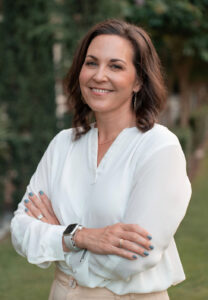
Dr. Kerri Ray Valencia is a seasoned education leader with over 22 years of experience in dual language education, curriculum development, and strategic leadership. As the Chief Executive Officer of ConnectEd Consulting, LLC, she specializes in instructional coaching, faculty development, and curriculum oversight, equipping schools and educators with the tools to meet the needs of culturally and linguistically diverse students.
Dr. Valencia is an accomplished presenter, having shared her expertise at prestigious conferences, including multiple appearances at the American Council on the Teaching of Foreign Languages (ACTFL), the La Cosecha Dual Language Conference, and the Greater Washington Association of Teachers of Foreign Languages (GWATFL). Her presentations have focused on best practices in dual language education, instructional strategies for multilingual learners, and the integration of socio-cultural competence in curriculum development.
She holds Advanced Professional Certificates in General Special Education (Infant–Adult), Early Childhood Education (Pre-K–Grade 3), and World Languages: Spanish (PreK–12) in Maryland, as well as Early Childhood Education (Pre-K–Grade 3) in the District of Columbia. She has also served as a CAEP accreditation site reviewer and is an active board member of Maryland READS, showcasing her commitment to literacy policy and instructional excellence. Dr. Valencia earned her EdD in Leadership for Change with a concentration in Dual Language Education from Fielding Graduate University, a Master’s in Instructional Technology from the University of Maryland Global Campus, and a BA in Spanish from the University of Wisconsin-Madison. Her career spans leadership roles such as Chief Academic Officer at Moreland University and classroom-based positions in the US and abroad. Recognized for her expertise, she continues to advance equitable educational practices globally.
Empowering English Language Learners using AI
Sarah Wysocki
ESL Teacher
Arlington Public Schools
At this session, attendees will gain new insights into how artificial intelligence tools like ChatGPT can be leveraged to create personalized, culturally responsive lessons that honor the identities and experiences of English Learners (ELs). Participants will learn how AI can assist in designing differentiated instruction, scaffolding content, and incorporating students’ cultural backgrounds to enhance engagement and learning outcomes. This session will also explore AI’s ethical and thoughtful use to ensure equity and access for all learners.
The call to action is for educators to embrace AI as a powerful tool to transform language teaching and learning. Attendees will leave with actionable strategies to integrate AI into their classrooms in ways that empower ELs, foster a sense of belonging, and elevate student voices. By using AI intentionally, educators can create learning experiences that are inclusive, relevant, and future-ready, ensuring all students have the opportunity to thrive.
About Sarah Wysocki
Sarah Wysocki is an accomplished educator with 20 years of experience, specializing in innovative, student-centered approaches to support English Learners (ELs). She holds a BSin Health Psychology, a master’s in Education, and postgraduate certificates in TESOL and Equity-Focused Educational Leadership. Sarah is passionate about leveraging artificial intelligence tools like ChatGPT to personalize learning and design culturally responsive lessons that reflect students’ identities, promote engagement, and foster equity.
Sarah has presented at leading conferences, including ACTFL and the joint NCTE/NCTM Conference, where she shared strategies for integrating AI into language instruction to meet the diverse needs of ELs. Her work focuses on using AI to differentiate instruction, provide scaffolds for language development, and create lessons that connect deeply to students’ cultural backgrounds.
As a member of ACTFL and professional communities like Grading for Equity, Project-Based Learning, and Culturally Responsive Education, Sarah actively collaborates with educators to advance equitable teaching practices. She combines her expertise with a commitment to innovation, ensuring technology is used ethically and intentionally to enhance learning outcomes.
Sarah’s dedication extends beyond the classroom through volunteer work with the Girl Scouts of America, PTO, and Boys and Girls Club of America, highlighting her focus on building inclusive and supportive communities. Her leadership and expertise make her a strong advocate for using AI to empower educators and transform education for ELs, ensuring every learner feels seen, valued, and capable of success.
